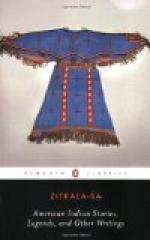“He, he, he! He, he, he!” he lamented. “Small Voice Woman, my own relative is being represented as the mother of this strange Blue-Star—the papers were made by two young Indian men who have learned the white man’s ways. Why must I be forced to accept the mischief of children? My memory is clear. My reputation for veracity is well known.
“Small Voice Woman lived in my house until her death. She had only one child and it was a boy!” He held his hand over this thumping heart, and was reminded of the letter in his pocket. “This letter,—what will happen when it reaches my good friend?” he asked himself. The chieftain rubbed his dim eyes and groaned, “If only my good friend knew the folly of turning my letter into the hands of bureaucrats! In face of repeated defeat, I am daring once more to send this one letter.” An inner voice said in his ear, “And this one letter will share the same fate of the other letters.”
Startled by the unexpected voice, he jerked upon the bridle reins and brought the drowsy pony to a sudden halt. There was no one near. He found himself a mile from the post office, for the cluster of government buildings, where lived the superintendent, were now in plain sight. His thin frame shook with emotion. He could not go there with his letter.
He dismounted from his pony. His quavering voice chanted a bravery song as he gathered dry grasses and the dead stalks of last year’s sunflowers. He built a fire, and crying aloud, for his sorrow was greater than he could bear, he cast the letter into the flames. The fire consumed it. He sent his message on the wings of fire and he believed she would get it. He yet trusted that help would come to his people before it was too late. The pony tossed his head in a readiness to go. He knew he was on the return trip and he was glad to travel.
The wind which blew so gently at dawn was now increased into a gale as the sun approached the zenith. The chieftain, on his way home, sensed a coming storm. He looked upward to the sky and around in every direction. Behind him, in the distance, he saw a cloud of dust. He saw several horsemen whipping their ponies and riding at great speed. Occasionally he heard their shouts, as if calling after some one. He slackened his pony’s pace and frequently looked over his shoulder to see who the riders were advancing in hot haste upon him. He was growing curious. In a short time the riders surrounded him. On their coats shone brass buttons, and on their hats were gold cords and tassels. They were Indian police.
“Wan!” he exclaimed, finding himself the object of their chase. It was their foolish ilk who had murdered the great leader, Sitting Bull. “Pray, what is the joke? Why do young men surround an old man quietly riding home?”
“Uncle,” said the spokesman, “we are hirelings, as you know. We are sent by the government superintendent to arrest you and take you back with us. The superintendent says you are one of the bad Indians, singing war songs and opposing the government all the time; this morning you were seen trying to set fire to the government agency.”




